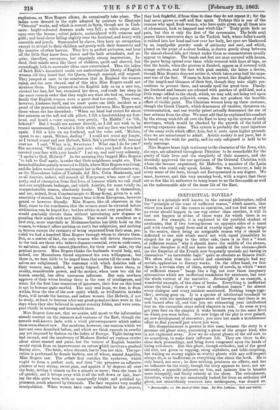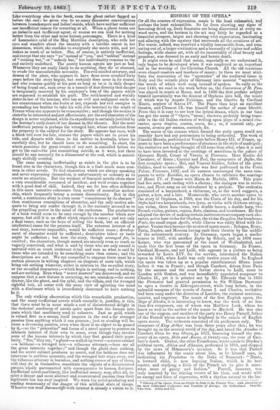INEFFECTUAL NOVELS.*
THEB.E is a principle well known to the natural philosopher, called the "principle of the want of sufficient reason," which asserts, that where you know all the causes in operation, and can find none why an event should happen in one way rather than another, it will in fact not happen in either of those ways for which there is no reason. For example, it is explained to the youthful student of mechanics, that if two towing-horses on opposite sides of a canal pull with exactly equal force and at exactly equal angles at a barge in the centre, .there being no assignable reason why it should be deflected to one side which could not with equal plausibility be alleged for its going to the other side, there is in fact a "want of sufficient reason" why it should leave the middle of the stream, and that therefore it will not leave the middle of the stream—facts (as the Emperor of the French now frequently reminds us) having in themselves "an inexorable logic" quite as absolute as Reason itself.. We often wish -that this useful and admirable principle had any certain application to literary works. On the other hand, we fear there is a certain class of them, certainly of novels, in which "want of sufficient reason" hangs like a fog, not over those imaginary alternatives which are ineffectual candidates for existence, but over the whole current of the narrative. Barosselife is an example, a wonderful example, of this class of books. Everything is ineffectual about the book ; there is a "want of sufficient reason" for almost every dialogue and every incident mentioned. Nothing hangs toge- ther; nothing goes on. It is a species of intellectual treadmill to read it, with the incidental aggravation of knowing that there is no mill turned after all, and that you are exhausting your intellectual feet on the ostensible steps called chapters in vain. As soon as you get your foot on the chapter it sinks beneath you to the same level on which you were before. No new ledge of the plot is ever gained, no new development of character; you have but made a troublesome effort to find yourself just where you were. The disappointment is greater in this case, because the story is a genuine old ghost story, containing a ghost of the proper kind, who is not explained away. Now we do expect ghosts of the old sort to do something, to make their influence felt. They are there to dis- close dark proceedings, and bring down vengeance upon the heads of living evil-doers. But this ghost, though orthodox, and of the good old. sort, not given to rapping, using alphabets, and table-inspiring, but wailing on stormy nights as worthy ghosts with any self-respect always do, is as ineffectual as everything else about the book. . He is only heard, not seen ; he does nothing, produces no effects, and has no influence on the story, though the story appears to have, not un- naturally, a soporific influence on him, and induces him to breathe more tranquilly, and finally subside /at the close. The refreshment, therefore, which we not unnaturally looked for from an orthodox old ghost, not scientifically resolved into nothingness, was denied us.
* Baronsel(ffe; or, The Deed of Other Days. By Mrs. Latham. Bell and Daldy. Like everything else in the book, even the ghost rather fagged us before the end: he gives rise to so many discursive conversations between housekeepers and ladies'-maids, which have neither sufficient nor insufficient reason for occurring at all. When a ghost turns oat an imbecile and inefficient agent, of course we can look for nothing better from the other and more human personages. There is a kind of Lancashire sybil of the Meg Merrilies description, who rolls her eyes and wanders about the country with a terrible secret in her possession, which she confides to everybody she meets with, and yet makes as much of as before. She, of course, is entirely ineffectual, and except that she says "yo" instead of "you," and "nobbut" instead of "nothing but," or "nobody bat," her individuality remains to the end entirely undefined. The purely human agents are just as bad. Whenever they are really likely to do anything, they die or abscond, to evade the uncomfortable necessity. The evil-minded attorney, and demon of the piece, who appears to have done some mischief forty years before the story begins, but certainly does none in it,s course, and who remains quietly at his post so long as he is in daily danger of being found out, runs away in a tumult of fear directly that danger is temporarily removed by his employer's loss of the papers which are supposed to establish his guilt. The cold-hearted and worldly sister-m-law of the heroine, who has an evil and malignant smile on her countenance when she looks at her, expends her evil energies in persuading her brother to take his wife (the heroine) to the south of France when she appears to be consumptive; and though the motive is staled to be interested widget affectionate, yet the evil character of the design is never explained, while its expediency is certainly justified by the heroine's early death of her disease in this climate. But the most ineffectual person is perhaps the wronged heir, whose exclusion from the property is the subject for the story. He appears but once, with a black veil over his face, rescues the papers which are to prove his title, and departs with them to his mother in Australia, where he carefully dies, lest he should have to do something. In short, the whole provision for great events of any sort is cancelled before we get to the end—the plot committing suicide, as it were, lest there should be any necessity for a denouement at the end, which is accord- ingly skilfully avoided. The same amazing ineffectuality as exists in the plot is to be found also in the characters, though this is a fault much more com- mon in other novels. To find characters which are always speaking and never expressing themselves, is unfortunately so ordinary as to excite no attention. But the weakest of feminine novels often show a very considerable command of incident, and weld events together with a good deal of skill. Indeed, they are far less often deficient in this mere narrative coherence than novels of masculine author- ship, which frequently betray a certain discontinuity. But in this novel, a continuous story is even more "conspicuous by its absence" than continuous conceptions of character, and the only motive ade- quate to bring any reader through it, is the curiosity aroused as to the propelling power in the mind of the authoress. The production of a book would seem to be easy enough by the number which now appear, but still it is an effect which- requires a cause ; and not only a final cause, such as the hope of selling the book, but an efficient intellectual cause for the process itself. The coherent interest of a real story, however impossible, would be sufficient cause ; develop- ment of character would be sufficient; descriptive talent or taste might be sufficient ; but here the story, though arranged for, is omitted ; the characters, though named, are scarcely even so much as vaguely conceived; and what is said by those who are only named is narrated with as much irrelevant detail and care as what is said by those who are intended to be something more than names ; and the descriptions are not. We are compelled to suppose there must be a certain pleasure in writing chapters on chapters of mere talk, which bring out nothing whatever, either in relation to the so-called story, or the so-called characters ;---which begin in nothing, end in nothing, and are nothing. Even when "secret drawers" are discovered, and we suppose that a new feature is occurring, we are mistaken—the secret. drawer, like the ghost, and the sybil, and the villain, and the wronged rightful heir, all occur with the same view of agitating the mind with a disclosure which is immediately discerned to have nothing in it.
The only striking observation which this remarkable production, and the many ineffectual novels which resemble it, justifies, is this, that there must be in some minds a sort of disinterested delight in the technical machinery of novels quite apart from the human inte- rests which that machinery used to subserve. Just as gold, which is valued first as a means, itself inspires in the end a far stronger passion than anything which it can procure; just as stealing will be- come a devouring passion, even when there is no object to be gained by it,—so the "properties" and forms of a novel appear to possess an intrinsic interest of their own to some, even though they involve none of the human interests by which they first gained their popu- larity. "See," they say, "a ghost—a walled-up tower—a secret cabinet —a beldame—a wronged heir—a villanous attorney,—liere are all the great interests together;" and though the ghost does nothing, and the secret cabinet produces no secret, and the beldame does not intervene in perilous moments, and the wronged heir stays away, and the villanous attorney is harmless, and nothing comes of any of them, still they do in themselves constitute the objects of a disinterested passion wholly unconnected with consequences to human fortunes. Ineffectual novel-machinery, like ineffectual money, may, after all, in- spire a deeper and more abstract and concentrated passion than their legitimate use has ever inspired. We warn the novel-producing and reading community of the danger of this artificial state of things. Whoever can read Baronscliffe with interest is already a victim to it.































 Previous page
Previous page